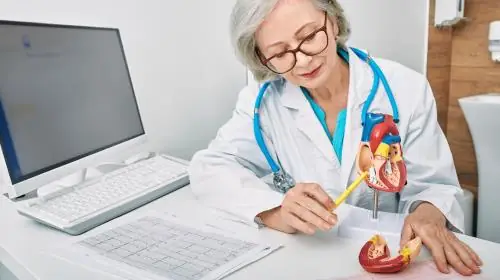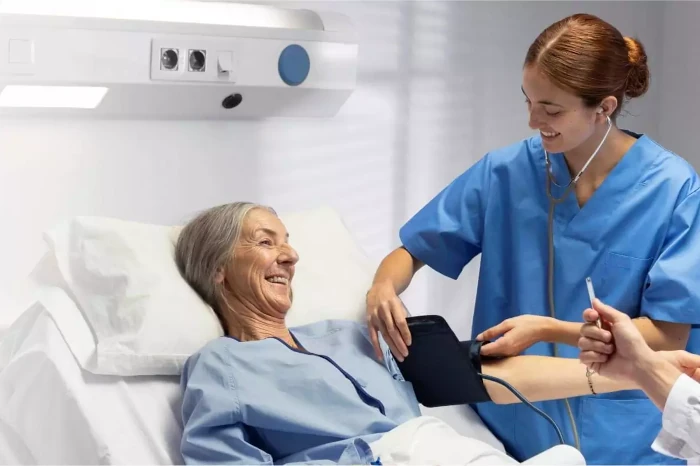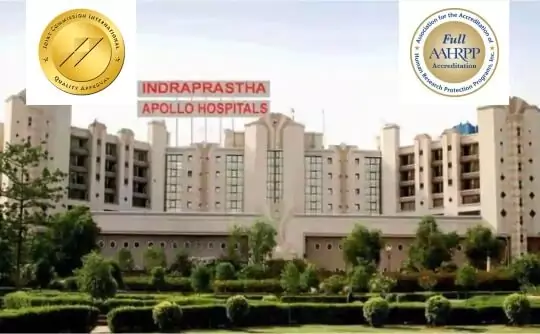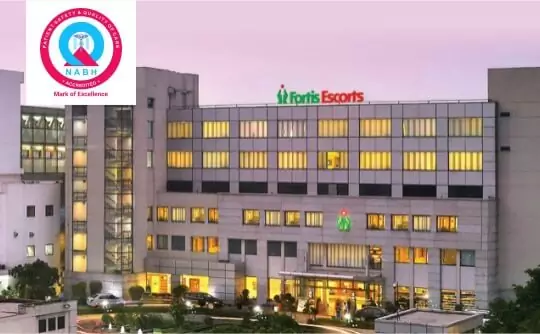

The primary expense for your Left Ventricular Assisted Device Cost in India will be the cost of the device itself. IndiCure's partner hospitals ensure that only FDA-approved LVADs are used, guaranteeing safety and quality. In comparison to the USD 60,000 to 70,000 prices in the USA, patients traveling to India can benefit from significantly lower overall treatment costs without compromising on quality of device or care.
A significant component of a Left Ventricular Assisted Device Cost in India is the heart surgeon's fees. IndiCure recommends highly experienced, skilled, board-certified heart surgeons who have the track record of delivering excellent results. While the charges may vary based on the surgeon's experience, you can be confident that you are in safe and capable hands when opting for affordable left ventricular assisted device surgery in India with IndiCure Health Tours.
In the pursuit of enhancing accuracy of surgical procedure and patient care, the medical equipment continually introduces new techniques and technologies into surgical procedures. These advancements are designed to improve outcomes, reduce recovery times, and increase the overall effectiveness of treatments. While these advancements can significantly benefit patient care, they may also lead to higher Left Ventricular Assisted Device Cost in India.
Selecting an accredited medical facility with skilled and qualified medical staff is essential for the success of a Left Ventricular Assisted Device in India. Larger cities in India generally provide superior medical facilities and more experienced heart surgeons, leading to higher costs. IndiCure Health Tours recommends surgical facilities in these larger cities to prioritize quality of care and ensure patient safety.
The costs related to left ventricular assisted devise include the pre- and post-surgical expenses. The pre-surgical expenses are associated with the age and medical condition of the patient requiring different number and type of investigations required. The post-surgical expenses include prescription medications and follow-up consultations for optimum recovery.
At IndiCure Health Tours, we consolidate most of the expenses for your Left Ventricular Assisted Device in India to provide you with an inclusive and cost-effective package tailored to your budget and individual requirements. After receiving medical reports, your case manager will provide an estimated cost based on a discussion with the heart surgeon in India.
The final cost of Left Ventricular Assisted Device in India can however be confirmed after your face-to-face consultation with the heart surgeon.

We Help you Choose the Right Treatment, Surgeon & Hospital

We Arrange Video/Telephonic Consultation with the Surgeon

We Assist you with Visa & Accommodation

We Receive you at the Airport and Drop you at Hotel/Hospital

We Assist you the at Hospital & Provide Post Operative Support
IndiCure Health Tours offers exclusive savings on your medical travel to India. We choose to partner with top hospitals in India and negotiate special rates with them, ensuring that you get the best possible price on your healthcare when you plan your medical travel with us.

Here is a set of questions you should consider asking before commencing your medical journey for the Left Ventricular Assisted Device in India.
Prepare to answer questions about your:
A ventricular assist device (VAD), also known as a mechanical circulatory support device, is an implantable mechanical pump that assists in the pumping of blood from your heart's lower chambers (ventricles) to the rest of your body. In those with weakening hearts or heart failure, a VAD is used.
Although a VAD can be implanted in your heart's left, right, or both ventricles, it is most commonly used in the left. A left ventricular assist device is implanted in the left ventricle (LVAD) and serves as a partial artificial heart.
The device can be used for short, intermediate, or long term- typically to treat advanced heart failure.
While you wait for a heart transplant or for your heart to become strong enough to pump blood on its own, you may have a VAD implanted. If you have heart failure and are not a suitable candidate for a heart transplant, your doctor may propose that you have a VAD implanted as a long-term treatment.
The LVAD is placed by performing an open-heart surgery. The components of an LVAD vary depending on the device type, but there are four core components:
In the chest, the pump unit is installed. The surgeon places it at the apex of the heart, where it gets blood. This blood is then sent to the aorta (the main artery that carries blood from the heart to the rest of the body) via a tube. It pumps blood from the left ventricle to the aorta continuously.
A driveline (cable) and a control system are connected to the pump (controller). The driveline connects the device to the controller (a small computer) on the outside of your body through the skin on your belly (abdomen). The controller controls the pump and displays messages and alarms to aid in system operation.
The LVAD is powered by a power supply (rechargeable batteries or a wire that fits into an electrical outlet).
Your doctor may recommend that you have a VAD implanted if:
You are waiting for a heart transplant: While you wait for a donor heart to become available, you may have a VAD installed temporarily. A VAD can keep blood flowing even if your heart is damaged, and it will be removed once your new heart is placed. It may also assist in enhancing the performance of other organs in your body that aren't operating properly, as well as other medical issues. A "bridge to transplant" is a VAD that is installed while you are waiting for a heart transplant.
Because of your age or other medical issues, you are currently ineligible for a heart transplant: People with heart failure who aren't ideal candidates for a heart transplant are increasingly using VADs as a long-term treatment. If you're over the age of 65, you might not be eligible for a heart transplant. In that case, the VAD would be implanted as a heart failure treatment. A VAD can help you live a better life.
Your heart's function can become normal agains: If your heart failure is only temporary, your doctor may recommend a VAD to keep your heart strong enough to pump blood on its own. The term "bridge to recovery" is used to describe this situation.
It's also feasible that a VAD will be placed for a brief period of time during or after heart surgery. For a few weeks or months, you may have a VAD installed.
Open heart surgery is needed to implant an LVAD. The surgery is done under general anesthesia and you will be asleep the entire time. The procedure lasts 4-6 hours.
The surgeon makes a long incision on the breastbone and accesses the heart by spreading the rib cage.
The surgeon connects one end of the LVAD tube to the heart's left ventricle and a tube exiting the other end of the external LVAD to the aorta.
A driveline connects the LVAD to a power source and control unit. The patient is then weaned off bypass, and the chest is stitched closed.
Patients with LVAD must carefully follow the guidelines given by their cardiac surgeon in order to improve their quality of life. Your ability to return home will be determined by your rate of recovery and medical condition.
Following surgery, cardiac rehabilitation is a vital program to participate in. Some activities, such as swimming, contact sports, and weight lifting, may be prohibited. Before and after the LVAD implant operation, it's critical to maintain healthy lifestyle adjustments.
The LVAD improves the function of the kidneys, liver, brain, and other organs by increasing blood flow to the body; it also improves the patient's strength and ability to participate in activities like cardiac rehabilitation by increasing blood flow to the body. The benefits of LVAD include:
Greater life expectancy: Patients with severe heart failure who receive LVAD live longer than those who receive only medical treatment.
Better quality of life: Patients with severe heart failure can use an LVAD to participate in activities that were previously impossible.
Fewer symptoms of heart failure: Shortness of breath, excess fluid, and weariness are all signs of heart failure that an LVAD can help with. This allows patients to feel better and participate in everyday activities, avoiding heart failure hospitalization.

New Delhi
Indraprastha Apollo Hospitals, New Delhi is a state of the art multi speciality tertiary-care hospital situated in the most posh area of South Delhi. Considered to be the flagship hospital of Apollo group, Indraprastha Apollo Hospital is one of the important landmarks not only in Delhi, but in the world map because of its popularity among the medical tourists. The hospital has been one of the most sought after medical institutions for patients from Asia Pacific and beyond.

New Delhi
Fortis Escorts Heart Institute and Research Centre is one of the most revered medical institutions not only in India, but the entire world. The institute has set benchmarks in cardiac care with path-breaking work over the last 25 plus years. The hospital has the most advanced technology and has seen the best outcomes even in the most complex cardiac cases; be it cardiac surgery, Interventional Cardiology, Pediatric Cardiology, Pediatric Cardiac Surgery or Non-invasive Cardiology
No. The heart is not replaced by a left ventricular assist device. Blood is taken from the left ventricle and sent to the aorta by the LVAD. It beats in time with the patient's heart. This aids the left ventricle's blood pumping.
With an LVAD, a patient can live for five and a half years or more. According to studies, 80-85 percent of patients survive for a year after receiving an LVAD, and 70-75 percent survive for two years. Patients who do not have an LVAD usually have a life expectancy of 12 months or fewer.
Most patients spend five to six days in the ICU after LVAD surgery before being transferred to a regular hospital room. The majority of patients stay in the hospital for two to three weeks./p>
The implantation of an LVAD is an extensive surgery requiring a two-three week stay in the hospital. Bleeding, blood clots, stroke, and infection are some of the dangers associated with the surgery.
It's known as "Bridge to Transplant" when an LVAD is installed in a patient who is waiting for a heart transplant. The patient's LVAD could stay in place for several years until a suitable heart donor becomes available. An LVAD can be installed as a permanent option if a patient is not eligible for a heart transplant.
A pacemaker and an LVAD serve very distinct roles. While an LVAD aids in the efficient pumping of blood, a pacemaker aids in the correction of an irregular or slow heartbeat. A pacemaker does not assist with pumping; rather, it generates electrical stimulation that regulates the heartbeat.
You will be able to work, exercise, and perform most of your other daily activities. However, you may need to make a few changes. You won't be able to swim or play contact sports. If you're flying, you'll have to inform security that you have a device implanted.
When planning your medical trip to India for a Left Ventricular Assisted Device in India, it is essential to account for several other expenses beyond the surgery itself. Proper budgeting will help ensure a smooth recovery and a stress-free stay. Here's a breakdown of costs to plan for:
You will need to budget for daily meals throughout your stay, both for yourself and any companions traveling with you. Depending on your dietary preferences and choice of dining (e.g., hotel restaurants, local eateries, or delivery services), meal costs can vary. Some hospitals or accommodations may offer meal packages, which could help you save.
Flight expenses are a key component of your trip. Airfare costs will depend on several factors, including your departure location, travel season, class of travel, and how far in advance you book your tickets. Booking early and monitoring for discounts or promotional fares can help reduce costs.
Once in India, you'll need to arrange local transportation. This includes taxi fares, ride-sharing services (like Ola or Uber), or private rental cars to travel between the airport, hotel, and hospital. Depending on your treatment schedule and recovery needs, you may also need to budget for trips to pharmacies or follow-up appointments.
Your lodging during recovery is another critical factor to plan for. You can opt to stay in a hotel near the medical facility for convenience or explore alternative options, such as service apartments, Airbnb rentals, or hospital guest houses, based on your budget and personal preferences. Some facilities may even offer special accommodation packages for international patients.
By carefully accounting for meals, airfare, transportation, and accommodation, alongside the Left Ventricular Assisted Device Cost in India, you can create a comprehensive budget. This will ensure a comfortable and well-planned trip, allowing you to focus on your recovery without unexpected financial stress.
Enhance your medical journey to India by availing these extra services.
Traveling abroad for medical reasons may be challenging. With our experience of over a decade and working with the best surgeons and top hospitals in India, we help make your medical tour easier and safer for you. We will guide you at every step of the way and make end-to-end arrangements for your surgery, travel, and stay.
Ramandeep Dhaliwal
I had great experience having rhinoplasty through Indicure. Dr. Ruchika from Indicure has helped me in finding best plastic surgeon, answering all my questions...
Read More
Joshua Archer
My name is Joshua Archer I'm from New Zealand, bay of plenty, kawerau I opted for the bypass surgery in January 2023 but planned it in advance for 28 September found IndiCure...
Read More
Kera Ren
Absolutely loved my experience with IndiCure - from first inquiring to meeting the surgeon pre op to my follow up post op. The surgeon was extremely approachable...
Read More
Andreana Paul
Had a wonderful experience. Visited India for my plastic surgery. From sending mails, airport pickup, comfortable accommodation and, to smooth hospital appointment booking...
Read More
Brandi Luce
I had the privilege of using Indicure's services for a cosmetic procedure that I had wanted for a long time but had always been apprehensive about. Ruchika helped me...
Read More
Jade M
Indicure Health Tours went above and beyond my expectations. They helped me with every aspect of my journey and were professional, kind and caring. I was...
Read More
The content on the website (www.indicure.com) is intended to be general information and is provided only as a service. All photographs on our website of before and after results are examples only, and do not constitute an implied or any other kind of certainty for the result of surgery.
Learn about IndiCure Health Tours' comprehensive editorial policy that strives to deliver trustworthy, helpful, relevant, accurate and people-first content on medical tourism in India.
It is not medical advice and should not be taken as medical advice. It should not be used to diagnose or treat a health condition and is in no way meant to be a substitute for professional medical care. You are advised to see a surgeon in person to assess what surgery may or may not accomplish for you.
It is also important to keep your expectations realistic and to understand that all surgical procedures carry risks and should never be taken lightly.